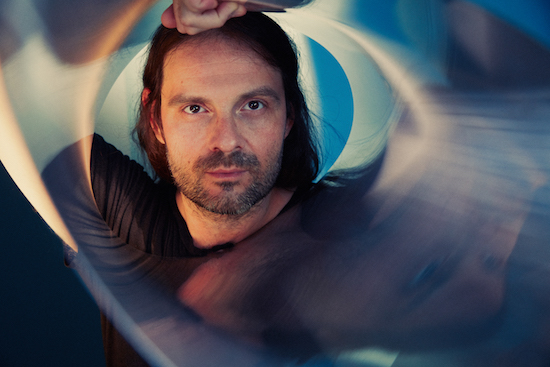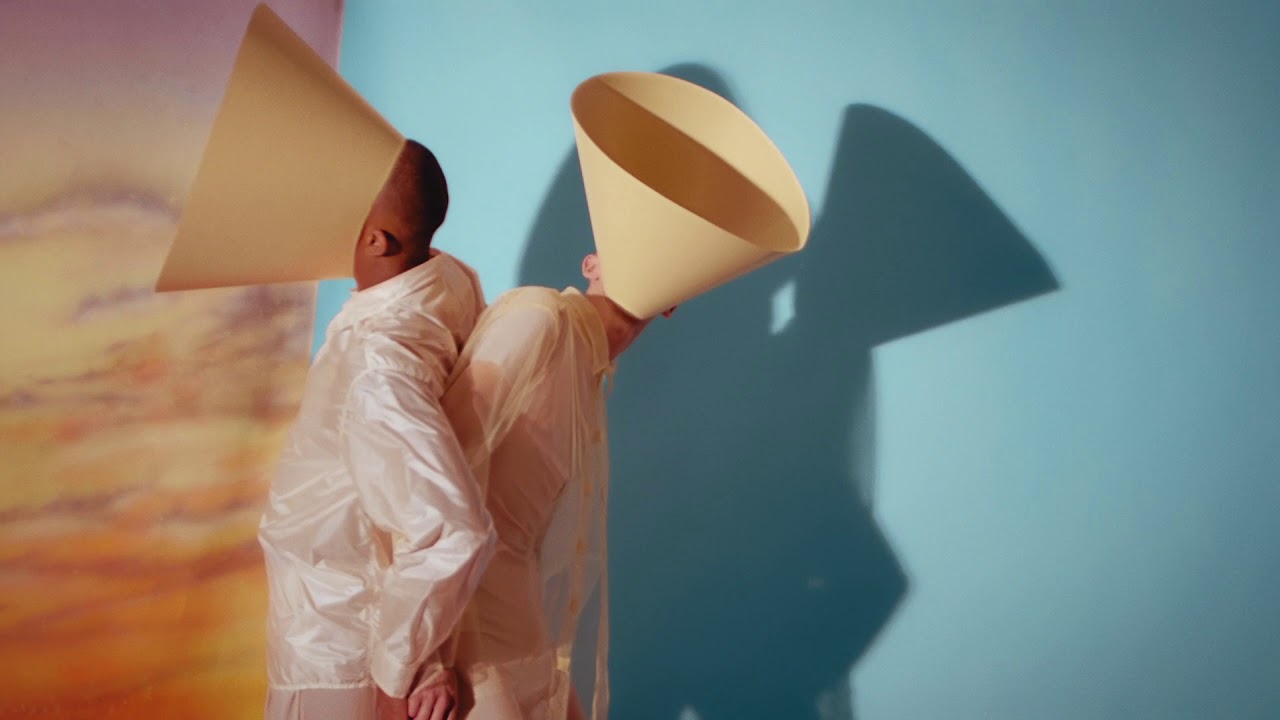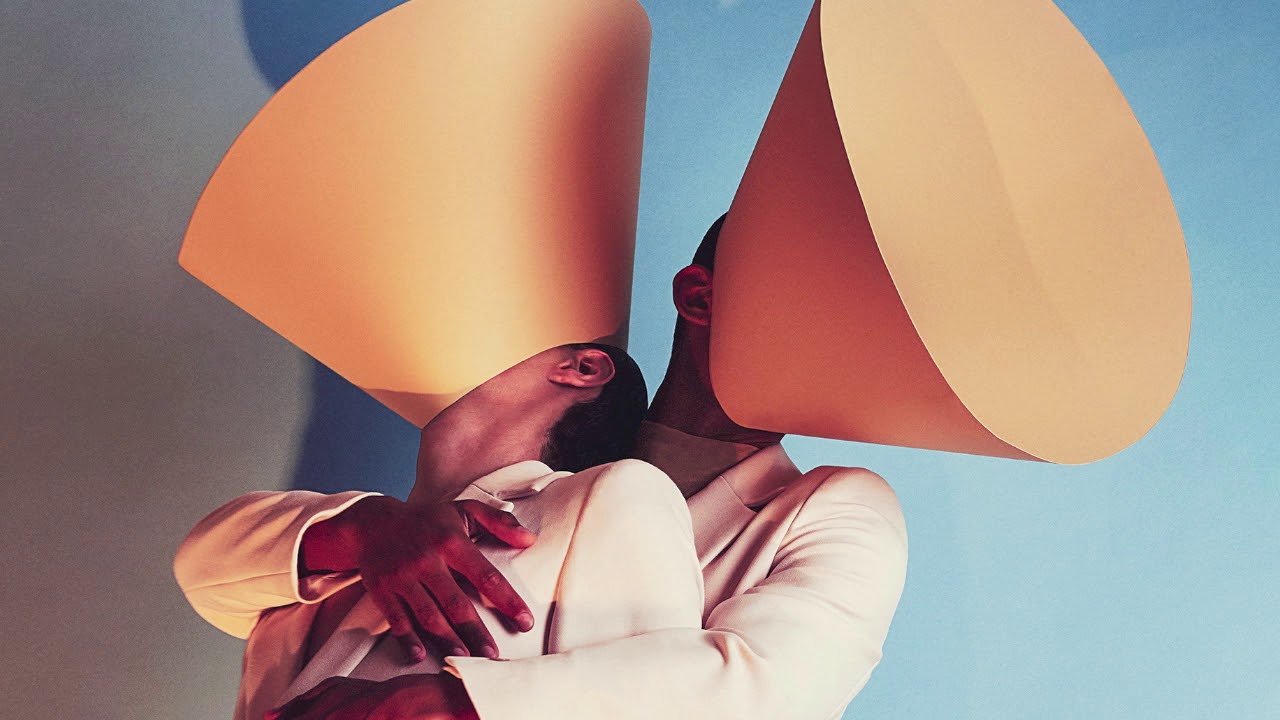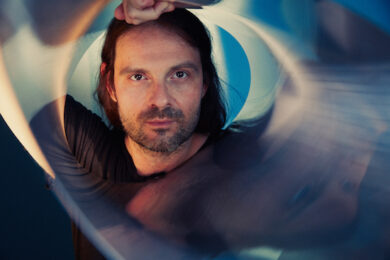Portrait by Emilie Elizabeth
Alessandro Cortini made his name touring and collaborating. He has played with the likes of Lawrence English, Merzbow, Ladytron and (perhaps most notably and regularly) Nine Inch Nails. He has made significant live contributions to Trent Reznor’s band and worked on the excellent Ghosts I-IV project. Cortini has always seemed a person who operates just below the surface. As a solo artist, he may have initially slipped under the radar for some first working under the moniker SONOIO in the late 2000s before releasing under his own name.
His work seemed to culminate in 2017’s AVANTI a deeply personal project that takes a mournfully nostalgic approach to ambient music. That record sees all of his musicianship culminate in something that’s not only haunting but also really grand and bold. It’s loaded with a constant unrelenting gush of emotion that teeters between euphoria and devastation, a sound that preempts the soundscapes of Bobby Krilic’s Midsommar score and Hildur Guðnadóttir’s music for Joker. Comparatively VOLUME MASSIMO, his new record, seems like a logical next step. Cortini is by his own accounts close to feeling settled in new home Berlin. And the listening experience offered by VOLUME MASSIMO is far less haunting and in fact more welcoming, if still very intense.
In his own words the opener ‘AMARO AMORE’ “serves as the bridge between [AVANTI] and [VOLUME MASSIMO]”. The latter in comparison to the ghostly former is a lot more subtle in its melancholy. At times it’s an understated dance record and at others, it’s a vivid nightmare. The accompanying A/V show is pivotal to the new record. It’s abstract and daring but by no means impenetrable. Both visuals and artwork are indebted to Cortini’s partner Emily Elizabeth whose work also graces the pristine but weird video for ‘BATTICUORE’. The Mute debutant is currently touring and is set to bring his unique show to several European festivals this month.
How have you found adapting to life in Berlin?
Alessandro Cortini: It’s great. I think independently of where you move to, if you have spent 20 years in another place – there’s a certain amount of adaptation to do. Things are different wherever you go in the world. I think it’s just taking a little bit longer than I expected to get used to. I guess I haven’t even really spent two years here with traveling and touring. Since January this the first time I’ve spent at ‘home’.
Could you see yourself staying?
AC: I don’t know, it’s hard to say. I think it will take a little longer for me to work out whether this is the place for me. For me, for now, I think it’s the ideal place; I like the city, It’s easy to get around – even though I don’t speak the language. It’s very central in Europe, and Europe happens to be the place where I can do what I do and make a living. This isn’t realistic in the US. When it comes to shows, there seems to be more of an infrastructure here, both in terms of government and associations. There’s more support for the kind of music I make.
What influence has Berlin had on the new record?
AC: It hasn’t influenced the record per se. It has probably influenced my ability to sit down and see [the music] as a record. I’m very grateful, I grew up with my Mom listening to The Beatles and a lot of other great music. I think, however, with that comes a lot of rules – a lot of structure so it’s almost a given that a song has to have a verse and chorus or a collection of songs has to be a record. Even from a financial point of view, it doesn’t make sense if you approach it that way.
When it comes to Berlin, I think I was able to see a certain collection of ideas, compositions and sound I’d recorded gravitate towards each other and form an entity that makes sense as a 46-minute collection of music, or an album.
So you don’t really see it as an album?
AC: I’ve stopped thinking about packaged releases and records at a creative level in the sense that I try and make music in one form or another every day. I treat the studio like a playground and I go in every day and I do something. I just turn machines on without expectation of ending with a song. By the end, I have a folder of stuff that I just put in my iTunes. And if they have a common factor an atmosphere or vibe they end up becoming a record. In this case, they were recorded over different periods. Some pieces are written at the same time as AVANTIi but for one reason or another, they didn’t make sense within that record. So they became the starting point for the new one ‘AMARO AMORE’ the first track serves as a bridge between the last record and the new one.
VOLUME MASSIMO is a bold title. What’s the significance of that name?
AC: The title is given simply because every time I listen to the tracks I turn them up as loud as I can. It feels great that way. It might not be good for my ears, but it made me think, "This is a record that sounds great if listened to live or loud or both."
Could you tell me a bit more about the Live A/V Show?
AC: For the kind of music I present live, in which there is no band, there isn’t much physically when it comes to my performance. I’m playing instruments that don’t require any physicality. I felt there had to be some sort of visual counterpart that connected to the sonic content in a way that made sense – rather than something just to accompany it and keep people entertained.
AVANTI was a record born out of Super 8 videos that my Grandfather had filmed of my family so it had a very specific story being told. When it comes to VOLUME MASSIMO It didn’t come from a story, it comes exclusively from a musical background and a very varied one at that. It’s not based on one instrument or colour or one texture, so coming up with visuals for it was a much longer process. My original idea was to have something that would be a good middle ground between a normal music video and something more abstract. My end goal was to make something that had a story, but not a specific one. The viewer could extrapolate their own interpretation of the narrative, which is what I hope happens when people listen to the music itself.
It was a long process, I worked with my wife, Emily Elizabeth on the cover which expands on the visuals from the show. We tried to recreate that and bring the record cover to life. Emily also directed the rest of the show she collected work of specific directors work that made sense with the pieces themselves.
You’re quite renowned for your collaborations in general, would you say you prefer working solo or with other artists?
AC: I go from one to the other. I think I’d get bored if all I did was my own music. I enjoy collaborating. At times I enjoy going back and playing with Nine Inch Nails. I enjoy scoring too. But I don’t think I could continue doing just one of those things forever. When there’s an active realisation that there’s a responsibility, when you know that’s the only thing that keeps you afloat, subconsciously it becomes a responsibility and you don’t see it as simply art anymore. There will always be a connection to the fact that it keeps me alive, but I feel more regenerated and refreshed when I move from working on my own music to a collaboration with someone or a remix or a score or going back on the road again. I think it’s healthy for me to have different creative outlets.
I Have to ask you about Lil Nas X sampling “Ghosts 34” on ‘Old Town Road’?
AC: I feel great for Trent and Atticus. I would have felt better if it was a track I worked on from that record. But I think it’s great. I mean would I listen to it personally? No. But utilising someone else’s creative output as long as it’s credited, there’s no problem with it. If someone is stimulated by someone else’s work to create their own – I think that’s great.
VOLUME MASSIMO is your first release with Mute what does that label mean to you?
AC: It means a lot, I grew up with Depeche Mode. Mute represents something more than just a label. The most pleasant discovery is that on the other side of a logo is a very tight group of people that love music, they’re open to dialogue and they’re trying their best to tailor whatever can be done when it comes to marketing and promotion. It’s fits the artists needs as opposed to applying the same policy to everyone. So far I can’t complain I find that there’s an open dialogue and a willingness to try new things and also willingness to me explain things that might not always be clear. I’d met Daniel Miller at various places before and he somehow ended up with a copy of some of the tracks from VOLUME MASSIMO early on, he reached out to see if I’d be interested in releasing with Mute. I was also like, "What do you mean you’ve listened to the track? This must be some sort of joke." It’s a weird thing to hear from Daniel himself he’s very involved in the label, more than I would have thought considering he has his own career as a DJ. He wouldn’t have to do it if he didn’t like doing it.
Interesting you mention Depeche Mode? Was electronic music always what you listened to when you were younger?
AC: It was a little different for me. There was never a genre division; if something was good your friends wouldn’t chastise you because you were listening to it. I listened to a lot of hard rock; a lot of Van Halen. I was born a guitar player and late 80s early 90s guitar music was really big in my life – and it still is to a certain extent. Although, I don’t have dreams of playing loud solos in front of lots of people now, luckily.
The music pool I grew up with was very varied. When I was very young, as I mentioned earlier my mum used to listen to a lot of The Beatles, Cat Stevens, The Stones but mostly The Beatles. One of my earliest memories was walking around with one of their greatest hits compilation, The Red Album [1962-1966]. I was running around the room looking at this piece of red vinyl. I must have been two or three years old. That’s why I try and make a transparent vinyl every time I put out a record because it reminds me of that moment.
Is there anyone in particular who’s had an influence on your music recently?
AC: Richard D. James, and not just musically. In terms of attitude he is probably the artist that I respect the most. Similar to a band like Tool he’s just been doing his thing without worrying too much about what the outcome is going to be. And he seems to have found the perfect balance between doing what he wants and making a living from it. This is tough especially these days because you’re supposed to have a very present image on social media. There are so many people making music, so if you disappear for a while people tend to forget about you, or at least that’s what you feel.
I’ve been listening to a lot of Suzanne Ciani reissues. Drab Majesty and Health are my two favourite bands at the moment. I’ve known Health since they played with Nine Inch Nails and I found out about them through Trent. I feel like both of these bands focus on songs, memorable songs. Not that Drab Majesty are an 80s band, but a lot of people from the 80s revival go back to the colours, but not the anthemic and memorable melodies that were part of that age. There almost seems to be a fight against memorable melodies these days.
You seem to mention, making a living off what you do quite a lot. Do you think it’s a good time to be an artist and do that?
AC: For me, it’s a great time to be an artist, because I’ve finally found a balance between being able to create and make a living off the result. I think it’s hard to find that because we are constantly told what be and what to do. A lot of the noise gets in the way of your voice and at the end of the day, your own voice is the only thing that will satisfy that creative part of you.
I’m extremely grateful that I’m at a point where I can go out and people will come and see the shows and enjoy the music, but at the same time that’s a by-product of me being happy with what I make. I don’t think too much about whether people like it or not. I think it’s hard for artists today, to try and listen to themselves instead of what they are told to sound like
I try not to worry about the outcome of my music and just follow the path and see the result. My rules are usually dictated by instruments, they usually have their own design decisions and they allow me to do certain things and not do others.
Alessandro Cortini plays Semibreve festival in Braga, Portugal on Friday 25 October. VOLUME MASSIMO is out now on Mute





